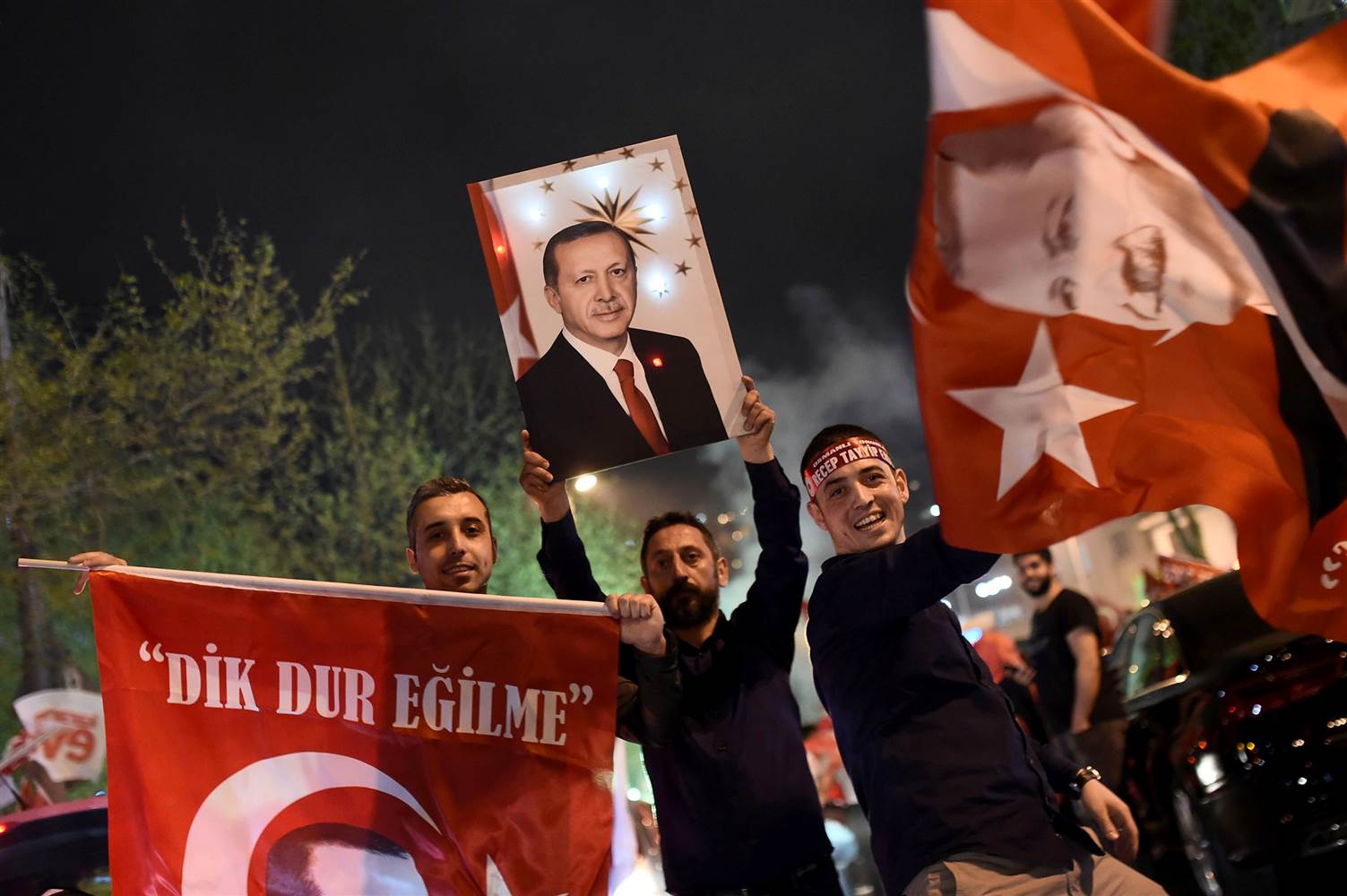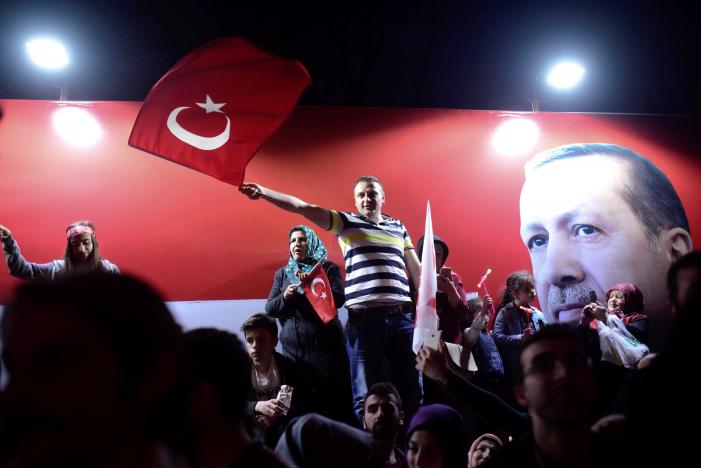Turks flocked to the polls Sunday where a majority voted “yes” in a referendum that will usher in 18 amendments to Turkey’s constitution and upend its parliamentary system of government.
As of Monday morning, 99.8 percent of ballot boxes throughout the country had been opened and showed that the “yes” vote stands at 51.4 percent. The referendum requires a simple majority, or 51 percent, to pass.
President of the Supreme Electoral Council Sadi Güven confirmed the “yes” vote’s triumph according to unofficial poll results. He said official results would be made available in about 10 days after any objections are considered.
President Recep Tayyip Erdogan, considered the mastermind of the referendum, said “a new era begins in Turkey,” adding that “no” votes trailed by about 1.3 million votes.
"Turkey has taken a historic decision,” Erdogan declared on Sunday. “That decision was no ordinary one. Today is the day when a change, a decision to shift to a truly serious administrative system, was made,” he added, reflecting the impetus for the referendum, which grew out of frustration within Turkey over what many believe is a heavily bureaucratic and bogged-down parliamentary system.
“I would like to thank all our citizens, regardless of how they voted, who went to the polling stations to protect their national will,” Erdogan told reporters Sunday at his official residence in Istanbul, the Huber Palace.
The ruling AKP party, led by Turkey’s Prime Minister Binali Yıldırım, introduced the proposed changes last year and later secured parliament’s approval to put them to a public vote. In a balcony address at the AKP headquarters in Ankara following the vote, Yıldırım hailed the referendum victory as “a new page in Turkey’s democratic history.”
“The nation had the final say in this historic referendum. We have said different things in [rally] squares; we have voiced different things to the nation but the nation gave its final world by saying “Yes.” There are no losers in this referendum. The whole nation emerged as the winner," Yıldırım said.
Changes to come as a result of the referendum passing include expanding Turkey’s Grand Assembly, or unicameral parliament, from 550 to 600 seats, lowering the required age to become a member to 18, and abolishing the Office of the Prime Minister. The president will have the power to appoint one or more vice-presidents, appoint four out of 13 judges to the highest judicial board, and sidestep military courts.
The biggest alteration, however, is to turn the country into a presidential republic, whereby the head of state and head of government is one in the same person. In this system, similar to that used in the United States, the president is the head of all executive agencies and has sole executive authority over the appointment and removal of cabinet officials.
Erdogan believes the new system will resemble those in France and the US and will bring calm in a time of turmoil marked by a Kurdish insurgency and conflict in neighboring Syria, which has led to a huge refugee influx.
Since its founding, the post-Ottoman, modern Turkish state has been governed under four different constitutions, passed in 1921, 1924, 1961, and the latest in 1982. The current constitution has been amended 17 times, with the last significant change in 2010. Overall, 113 of its 177 articles have been amended.
Shortly before Prime Minister Yıldırım declared a victory for Erdogan, thousands poured in front of the Ankara headquarters of the AKP party to welcome the triumph. Dances, songs, flares, flags, car horns and chants of "evet," meaning “yes” in Turkish, could be heard throughout the city,

According to state-run Anadolu agency, Azerbaijani, Palestinian, Qatari, Pakistani, Hungarian, Macedonian, Saudi, Sudanese and Kenyan leaders passed along congratulatory messages to Turkey's Foreign Ministry. Azerbaijan’s President Ilham Aliyev delivered his congratulation message via phone to Erdogan personally, according to Aliyev’s press office.
“As of now, there is a new Turkey. There will be stability and trust in the new Turkey,” Turkish Foreign Minister Mevlüt Çavuşoğlu said from southwestern Antalya province along the Mediterranean coast.
“In this new Turkey there will be reliance; the goals of 2023, 2053 and 2071 will be reached," he said, addressing a crowd gathered at the AKP party’s provincial headquarters.
In 2007 the government attempted a referendum to legalize electing the country’s president via popular vote, which passed and made President Recep Tayyip Erdogan the country’s first directly-elected head of state in 2014. This sparked fierce debates and confusion amongst government leaders, questioning who has what authority over various issues.
Following years of conflicting interests amongst Turkey’s power brokers, Erdogan and the AKP party decided to call for a clear mandate on amending the constitution to strengthen the powers of the presidency. Yesterday’s referendum was a result of their long sought-after efforts.
Ibrahim Dogus, Director of the Center for Turkey Studies in London, told Caspian News that the referendum divided Turkey into two camps, with Erdogan – whom he called “the most powerful man in Turkey’s politics” – on one side, and anti-referendum supporters on the other.
“The country is very much polarized with this referendum. It has split into two,” Dogus said. Prior to this referendum, there were seculars, lefts, center-lefts, democrats, liberals against the rest of the population who were nationalists, Islamists, and those were backing President Erdogan. Now, with this referendum we’re clearly seeing the line in between - the country is divided 50-50. The question is how the country is going to become a united strong country economically, politically and security-wise,” Dogus added, predicting continued polarization.
Recognizing Turkey’s significant role in international politics, Dogus believes the referendum will harm the country’s global image.
“Turkey has been a reliable partner, with the biggest army within the NATO alliance. Now the country is split into two. International partners will not be relying that much on the country based on their own worries. But in a country that is so split, who would go and dare to invest economically, who would dare to rely on Turkey on security issues? These all become a big danger for Turkey’s international presence as one.”
But not everyone agrees with such a view. Ilgar Velizade, the head of the Club of Political Scientists of South Caucasus, believes Erdogan will now be able to solve the country’s problems faster and more effectively.
“In crisis management situations, presidential republics have been proven to be more effective than parliamentary republics. Parliamentary rule takes too much time to pass laws or come to decisions,” Velizade told Caspian News.
“As such, they essentially reinforce activities by terrorists to realize their plans because of the lag in policy passage and decision-making. An executive presidency, on the other hand, can approve laws faster and increase the power of anti-terrorism measures in Turkey,” he said.







 President Ilham Aliyev shed light on the evolving contours of the peace process with Armenia during an international conference in Baku this week. ...
President Ilham Aliyev shed light on the evolving contours of the peace process with Armenia during an international conference in Baku this week. ...
 Azerbaijan and Armenia started the process of demarcation of their border on Tuesday, with the installation of the first border markers based on ge...
Azerbaijan and Armenia started the process of demarcation of their border on Tuesday, with the installation of the first border markers based on ge...
 Armenian sappers commenced on Monday mine-clearance operations in the territories adjacent to the Saint Mary Church in village of Voskepar (Armenia...
Armenian sappers commenced on Monday mine-clearance operations in the territories adjacent to the Saint Mary Church in village of Voskepar (Armenia...
 Iran and Pakistan have signed eight cooperation documents in various fields, and agreed to strengthen ties to fight terrorism in the region.
Iran and Pakistan have signed eight cooperation documents in various fields, and agreed to strengthen ties to fight terrorism in the region.
 As the conflict between Ukraine and Russia escalates, the strategic importance of Kharkiv, Ukraine's second-largest city, has come sharply into focus.
As the conflict between Ukraine and Russia escalates, the strategic importance of Kharkiv, Ukraine's second-largest city, has come sharply into focus.
 President Aliyev emphasized the critical role of the North-South Transport Corridor in fostering transport cooperation between Azerbaijan and Russi...
President Aliyev emphasized the critical role of the North-South Transport Corridor in fostering transport cooperation between Azerbaijan and Russi...



